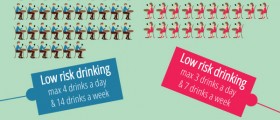
Alcoholism is one of the many addictive disorders, characterized by compulsive and uncontrolled consumption of alcohol. This is a very disabling disorder, since it affects individuals to such a great extent that they continue drinking despite all the negative effects on their health, relationships, social standing, and career. Alcoholism is often referred to as alcohol dependence or alcohol abuse. This condition, like any other addictive disorders, is medically defined as a treatable disease. It is associated with severe physiological alterations in the brain, and the development of tolerance and physical dependence, affecting the individual's capacity to control alcohol consumption. This major health problem affects public health worldwide and experts estimate that only in America, 12% of adults have had an alcohol dependence problem at some point in their life.
Alcohol Abuse Statistics
According to the World Health Organization, about 76 million people worldwide are affected by alcohol-related disorders. Only in the United States, more than 50 percent of adults have reported that one or more of their family members or close relatives has a drinking problem. What is even more concerning is that more than 70 percent of youth cite their parents as the primary influence on their decision to drink alcohol. This is a warning sign to the society to respond appropriately and think about the consequences of such an irresponsible behavior, especially if we know that more than 50 percent of homicides in the United States are alcohol related. It sounds even more serious if we know that more than 100.000 deaths in the United States each year are caused by the excessive alcohol consumption. This includes drunken driving, cirrhosis of the liver, falls, cancer and stroke. Only in 2001, more than half a million people were injured in car crashes associated with alcohol abuse. It is estimated that more than 3 million teenagers in the United States, aging between 14 and 17, have already developed drinking problems. More than 40% of those who start drinking at age 14 or younger will become alcoholic. Most of them will not seek any treatment before the age of 26.
Prevention of Alcoholism
Many governments and health organizations have developed alcohol policies in order to decrease the damage of alcoholism. In most of the regulated societies, the legal age at which alcohol can be purchased has drastically increased in the last couple of years. Alcohol is banned or restricted from advertising and many educational campaigns are taking place every day all over the world. However, the early intervention is most important to prevent alcoholism among young people, and the significant role of parents, school and other role models still remains incomparable.

















Your thoughts on this
Loading...